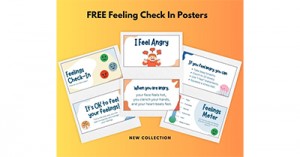Emotional awareness and self-regulation are crucial skills for young children, helping them navigate social interactions, manage their feelings, and develop resilience. The following article provides information on Why Are These Skills Important?, How to Support These Skills in Early Childhood, Using Language To Help With Emotional Awareness and Self-Regulation Skills In Early Childhood, Examples of Self-Talk To Support Self-Regulation, Using Social Scripts, and more.
Why Are These Skills Important?
-
Emotional Awareness: Helps children recognize and understand their emotions, leading to better communication and empathy.
-
Self-Regulation: Enables children to control impulses, adapt to changes, and respond appropriately to challenges.
How to Support These Skills in Early Childhood
- Model Emotional Expression—Caregivers and educators should openly express emotions and demonstrate healthy coping strategies.
- Create a Safe Environment—A predictable and supportive setting helps children feel secure enough to explore their emotions.
- Teach Emotional Vocabulary—Encouraging children to name their feelings (e.g., happy, frustrated, excited) builds emotional intelligence.
- Use Mindfulness and Breathing Exercises—Simple techniques like deep breathing or counting to ten can help children regulate emotions.
- Encourage Problem-Solving—Guiding children to think through challenges fosters independence and emotional control.
- Incorporate Play-Based Learning—Games and role-playing activities help children practice self-regulation in a fun and engaging way.
Using Language To Help With Emotional Awareness and Self Regulation Skills In Early Childhood
Language plays a powerful role in helping young children develop emotional awareness and self-regulation. By providing them with the right words and communication strategies, caregivers and educators can support their ability to express feelings and manage emotions effectively.
How Language Supports Emotional Awareness
-
Naming Emotions—Teaching children to identify and label their feelings (e.g., "I feel frustrated" or "I am excited") helps them understand their emotions.
-
Using Descriptive Language—Encouraging children to describe what they are experiencing fosters self-awareness and emotional intelligence.
-
Storytelling and Books—Reading stories that explore emotions helps children relate to characters and recognize different feelings.
How Language Supports Self-Regulation
-
Encouraging Self-Talk—Teaching children to use phrases like "I can take deep breaths" or "I need a break" helps them regulate emotions.
-
Modeling Positive Communication—Caregivers can demonstrate how to express emotions calmly and respectfully.
-
Using social scripts—providing structured phrases for common situations (e.g., "Can I have a turn?" instead of grabbing a toy)—helps children navigate social interactions.
Examples of Self-Talk To Support Self-Regulation
Here are some child-friendly self-talk phrases that support emotional regulation and build resilience in early childhood:
Self-Talk for Calming Down
-
“I can take deep breaths to feel better.”
-
“It’s okay to feel upset. I can handle this.”
-
“I need a quiet space for a moment.”
Self-Talk for Problem Solving
-
“What can I do next?”
-
“I can ask for help if I’m stuck.”
-
“Let me try a different way.”
Self-Talk for Confidence and Perseverance
-
“I can do hard things.”
-
“I’ll keep trying, even if it’s tricky.”
-
“Mistakes help me learn.”
Self-Talk for Social Situations
-
“I can use kind words.”
-
“I can wait for my turn.”
-
“I can walk away if I feel angry.”
These phrases can be introduced through role-play, storybooks, or visual cue cards.
Using Social Scripts
Social scripts are a fantastic tool for helping young children navigate tricky emotional moments and build self-regulation skills. They offer predictable, supportive language that children can internalize over time—turning adult-guided phrases into their own self-talk. Here are a few child-friendly social script examples you can use or adapt:
Ready / Not Ready Script
-
Adult: “I’m not sure you’re ready to join the group yet.”
-
Child version: “I’ll be ready when I’m sitting calmly with quiet hands.”
-
Follow-up: “Nice job getting yourself ready. You did it!”
Hard to Do / Easy to Do Script
-
Adult: “This looks kind of hard, doesn’t it?”
-
Child version: “It’s hard because it’s noisy. Maybe I can use my headphones.”
-
Follow-up: “That was tricky, but you made a plan and it worked!”
Big Deal / Little Deal Script
-
Adult: “This feels like a big deal, huh?”
-
Child version: “It’s a big deal because I don’t like when my toy gets taken.”
-
Follow-up: “Let’s think of something we can do about it together.”
Problem-Solving Script
-
Adult: “What’s the problem, and what can we do?”
-
Child version: “I’m feeling mad. I can take deep breaths and ask for help.”
These scripts are most effective when paired with visual supports, role-play, and consistent modeling.
Further Reading
30 Emotional Regulation Activities For Toddlers and Preschoolers
Using Music, Rhythm And Movement To Enhance Children's Self-Regulation
Supporting Children's Self-Regulation
Encouraging Children to Express Emotions Appropriately







 Here’s a comprehensive Mobile Phone and Smart Watch Policy tailored for early childhood education and care (ECEC) services in Australia, aligned with the latest 2025
Here’s a comprehensive Mobile Phone and Smart Watch Policy tailored for early childhood education and care (ECEC) services in Australia, aligned with the latest 2025 Across the early childhood education and care sector, educators are sounding the alarm: current staffing ratios are insufficient to deliver safe, meaningful, and developmentally appropriate
Across the early childhood education and care sector, educators are sounding the alarm: current staffing ratios are insufficient to deliver safe, meaningful, and developmentally appropriate Thanks to the new National Model Code and upcoming regulatory changes under the National Quality Framework (NQF), early childhood services across Australia must now implement
Thanks to the new National Model Code and upcoming regulatory changes under the National Quality Framework (NQF), early childhood services across Australia must now implement In the quiet hum of a weekday morning, something felt off. Preschool doors opened, but classrooms remained silent. No greetings. No redirection. No educators. And
In the quiet hum of a weekday morning, something felt off. Preschool doors opened, but classrooms remained silent. No greetings. No redirection. No educators. And A: In early childhood education and care (ECEC) settings across Australia, mobile phone use by educators is now subject to strict national reforms aimed at
A: In early childhood education and care (ECEC) settings across Australia, mobile phone use by educators is now subject to strict national reforms aimed at The end of the year is a busy and emotional time in early childhood services. Many services close for a short period over Christmas, and
The end of the year is a busy and emotional time in early childhood services. Many services close for a short period over Christmas, and Being an educator is both rewarding and demanding. Between planning, documentation, room management, and supporting children’s wellbeing, the workload can feel overwhelming. That’s why practical
Being an educator is both rewarding and demanding. Between planning, documentation, room management, and supporting children’s wellbeing, the workload can feel overwhelming. That’s why practical In early childhood education and care, child safety is not just a number—it’s a practice. While educator-to-child ratios are essential, they are only one part
In early childhood education and care, child safety is not just a number—it’s a practice. While educator-to-child ratios are essential, they are only one part A: Something as simple as a child asking to braid an educator’s hair—or children braiding each other’s can spark important questions about connection, trust, and
A: Something as simple as a child asking to braid an educator’s hair—or children braiding each other’s can spark important questions about connection, trust, and Here's a comprehensive, sector-responsive policy and procedure framework for the safe use of digital technologies—including CCTV—tailored for early childhood education settings. It balances child safety,
Here's a comprehensive, sector-responsive policy and procedure framework for the safe use of digital technologies—including CCTV—tailored for early childhood education settings. It balances child safety,


